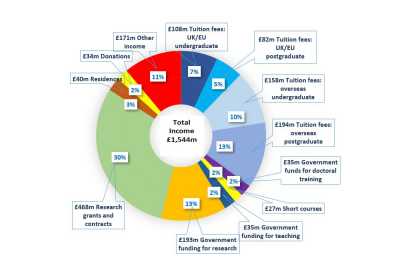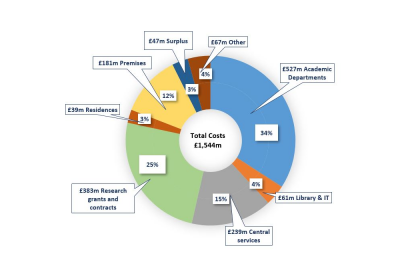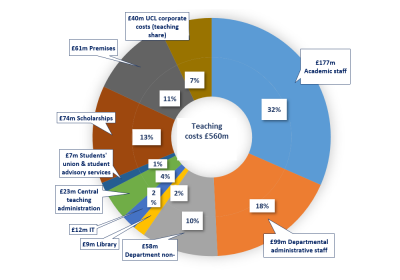In 2019-20, UCL earned £1,544m and spent a total of £1,497m, with a surplus of 47m for reinvestment. See below how that income is used to ensure the best possible student experience.
Like most universities that receive public funding, UCL is a charity and raises income from a variety of sources. UCL uses this income to provide teaching and related support as well as conducting research and engaging with businesses and local communities.
The teaching support includes a wide range of activities benefiting students generally such as the provision of digital education, library and IT services, careers, welfare and other student services, part-funding the Students’ Union, and contributing to the operation of the campus. As with other charities, any surplus income is reinvested back into improving services and facilities for the future.
We show here the main sources of income, and types of expenditure, for the financial year 2019-20 covering the twelve months - from 1st August 2019 to 31st July 2020.
Frequently Asked Questions
- Why doesn’t UCL spend all its income?
UCL, like other universities in the UK, is a charity so has no shareholders or owners to which it has to pay out money. Instead, the surplus of income over expenditure is re-invested so that it pays for new buildings, refurbish older buildings, excellent academics and improved student services. In addition, some of the surplus from prior years is used to maintain services in years, such as 2020-21, when UCL is faced with sudden additional costs.
- So am I paying for new buildings which will only be completed after I have graduated?
Yes, to some extent. Some of the money being spent on new buildings is in fact coming from bank loans, but of course current students are enjoying the benefits of new buildings, such as the new Student Centre, which were partly financed by fees paid by past students.
- Are my fees good value?
UCL maintains an excellent record for job outcomes and has once again been ranked in the top 5% of institutions in the world for employability. And of course, there are benefits from a UCL education which cannot be quantified in purely financial terms, such as the opportunities offered for volunteering, entrepreneurship, personal development and global awareness.
- How are the fees set?
Fees for UK undergraduate and initial teacher training students are set by the UK Government. The fee for 2020-21 new starters was set at £9,250 and this fee remains fixed for the duration of their course. It has not changed for several years.
EU students who started their courses before the end of December 2020 pay the same fees as UK students and will continue to do so for the remainder of their current course. From 2021-22 new EU students will be paying fees at the overseas level.
UCL itself sets fees for international UG students, and for all postgraduate taught and research students. These fees are reviewed annually, taking into account the level of demand and the fees charged by those UK Russell Group and world leading international competitors perceived as our major competitors when attracting high quality students. Other factors are also relevant, for example postgraduate taught course fees are usually higher than those for undergraduate courses because the academic year for these programmes are longer. UK postgraduate research students with UKRI and CDT awards will automatically have their fees covered by their awards.
- Why are international students charged so much more than UK and EU students?
The Government provides funds for some of the teaching costs for UK and EU students, particularly in respect of those subjects, such as sciences and medicine, which require laboratories and special equipment. In the past, much of the expenditure on buildings and facilities came from the UK Government and was raised by taxation on the UK population. Also UCL provides extra regulatory and support services for international students, for example help with immigration.
- What is the average expenditure per student across UCL?
For 2019-20 there were approximately 37,000 full time equivalents (FTE) students registered at UCL. With teaching costs at £560m for the year this means that average expenditure per student was £15,000.
- How did COVID-19 impact expenditure in 2019-20?
UCL incurred additional costs relating to online teaching and student support in the last few months of the financial year 2019-20, but at an institutional level these extra costs were offset by savings made by cutting back on non-urgent spend and on imposing a staff recruitment freeze in some central services. During the first term of 2020-21 UCL has spent considerably more than anticipated on on-line teaching and supporting students, and has lost money on residences and catering.
 Close
Close




